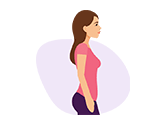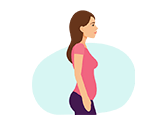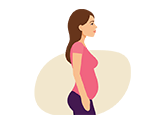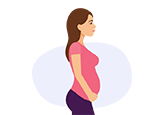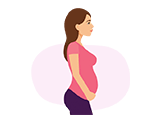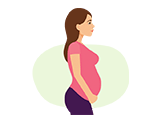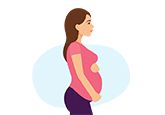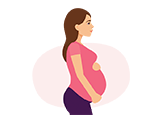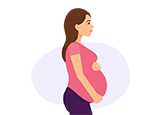Pregnancy Diet Plan - Month by Month
Diet Plan Chart
6
First Month of Pregnancy - Foods to Eat & Avoid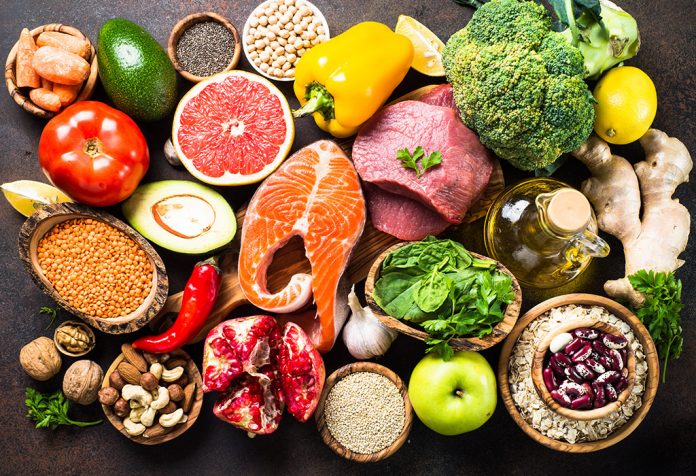

During pregnancy, nutrition and diet play a vital role in the healthy growth and development of the baby. The diet during the first month of pregnancy plays a significant role in the health of the developing foetus. This article will guide you about which foods to include and which ones to avoid during the first month of pregnancy.
Foods to Eat during the First Month of Pregnancy
By the time you test positive for pregnancy, you are already around 2 ½ weeks pregnant. So, accounting for that, you need to follow a specific diet plan during pregnancy. The first month pregnancy diet chart should include plenty of fruits and vegetables. Here are other foods you should include in your first-trimester diet for a healthy pregnancy:
1. Dairy Products
Dairy products (including fortified ones) are a great source of calcium, Vitamin D, protein, healthy fats, and folic acid. Include yoghurt, milk, and hard cheese in your first-month pregnancy diet.
2. Folate-rich Foods
Folate or folic acid is essential for the proper development of the baby’s neural tube, which later develops into the brain and spinal cord. It is important to add folate-rich foods to your diet even if you are taking folic acid supplements. Examples of such foods are spinach, kale, asparagus, citrus fruits, beans, peas, lentils, avocado, Brussels sprouts, and okra.
3. Whole Grains
Wholegrains are a healthy source of carbohydrates, dietary fibre, Vitamin B-complex, and minerals like iron, magnesium and selenium. These are essential for your baby’s healthy growth and development. Examples of whole grains are barley, brown rice, buckwheat, bulgur wheat, millets, and oatmeal.
4. Eggs and Poultry
Eggs are a good source of proteins, Vitamin A, B2, B5, B6, B12, D, E, and K, and minerals like phosphorous, selenium, calcium and zinc. Poultry is also an excellent source of proteins. Eating eggs and poultry meat in the first month of pregnancy will ensure healthy development of the foetus.
5. Fruits
Fruits such as musk melons, avocados, pomegranates, bananas, guavas, oranges, sweet lime, strawberries, and apples contain several vitamins, minerals, and antioxidants necessary for the growth of the unborn baby.
6. Vegetables
Eating plenty of vegetables will ensure your baby gets the widest range of nutrients Some vegetables you should add to your diet are broccoli, kale, spinach, carrots, pumpkins, sweet potatoes, tomatoes, bell peppers, corn, eggplant, cabbage, etc.
7. Seeds and Nuts
Seeds and nuts are excellent sources of healthy fats, vitamins, proteins, minerals, flavonoids, and dietary fibre. Make sure you eat these regularly in the first month and also throughout your pregnancy for a healthy baby.
8. Fish
Fish has low-fat and high-quality protein. It is also a very good source of Omega-3 fatty acids, Vitamins B2, D, and E, and essential minerals like potassium, calcium, zinc, iodine, magnesium, and phosphorous. However, avoid swordfish, raw shellfish, and limit tuna, salmon, mackerel, sardines, trout and herring.
9. Meats
Meats contain Vitamin B, proteins, zinc, and iron which are good for you and the baby. Include lean meats in your diet in the first month of pregnancy. It is also better to avoid undercooked meats.
10. Cod Liver Oil
Cod liver oil is rich in Omega-3 fatty acids that are essential for brain and eye development of the fetus. Another reason you should consume this is because of the presence of Vitamin D. Low intake of this vitamin can lead to pre-eclampsia, all the more reason pregnant women should include cod liver oil in their first month of pregnancy diet.
11. Dried Fruits
One serving of dried fruits can provide large amounts of vitamins, minerals, iron, potassium and folate to pregnant women. Prunes and dates are good choices now. However, these are also rich in natural sugar, so avoid taking more than one helping at a time.
12. Iodised Salt
Using iodised table salt during pregnancy is very important. That’s because salt infused with iodine can help the baby’s nervous system and brain to develop properly.
Foods To Avoid in the First Month of Pregnancy
There are some foods which should be avoided during early pregnancy as they may cause harm to the growing baby. Here are some of them:
1. Soft Cheese
Soft cheese is made from unpasteurised milk and may contain bacteria that can cause food poisoning. Hence, it is best to avoid soft cheese during early pregnancy.
2. Packaged and Processed Foods
Packaged and processed foods such as juices, microwave-ready meals, cakes, biscuits, condensed milk, etc. contain additives, preservatives, high levels of sugar and sodium, and empty calories that are neither good for you nor your baby. Some packaged foods may also contain bacteria that can cause food poisoning. Eat fresh, home-cooked meals made with natural or organic produce instead.
3. Seafood
Seafood contains high levels of mercury, which has been linked to foetal brain damage and delay in development milestones. Hence, avoid seafood during early pregnancy and include freshwater fish in your diet instead.
4. Papayas
Unripe and semi-ripe papayas contain latex, which can trigger uterine contractions and cause preterm labour or even miscarriage. Avoid these during pregnancy. Ripe papayas, however, contain several nutrients and can be consumed in moderation if your doctor gives you the go-ahead.
5. Pineapples
Pineapples contain a substance called bromelain which can soften the cervix. Softening of the cervix in early pregnancy can lead to miscarriages or preterm labour. So, it is better to avoid pineapples during early pregnancy.
6. Raw/Undercooked Eggs and Meats
Raw or undercooked meats can be contaminated by bacteria, salmonella, listeria, etc. which can affect the development of the unborn child.
7. Junk Food
Consuming too much junk food during pregnancy has been linked to mental health problems in children such as depression, anxiety, and attention-deficit hyperactivity disorder. Studies have shown that consuming these kinds of foods during pregnancy can cause obesity in children.
8. Caffeine
Caffeine intake should be limited in early pregnancy as excess of it affects the nervous system and causes sleeplessness, irritability and nervousness. It has also been linked to an increased risk of miscarriage.
9. Alcoholic Beverages
Alcohol is very bad for the developing foetus and can cause serious birth defects. Avoid alcohol at all times completely especially during pregnancy.
10. Sugary Foods
A pregnant woman needs an extra 300 calories every day to support the growth of the unborn child. However, consuming too many sugary foods such as sweets can cause weight gain and gestational diabetes.
11. Unpasteurised Products
During the first month of pregnancy and throughout, unpasteurised juice and milk are a strict no-no as these may contain harmful bacteria like E.coli. Goat and sheep milk should also be avoided.
First Month Pregnancy Diet Tips
Here are some things to keep in mind when planning your diet for the first month of pregnancy:
Take prenatal vitamins, including folic acid.
Talk to your doctor before embarking on a strict diet as reduced food intake can affect the development of the foetus.
Moderation is key – even healthy foods should be had in moderation. Excess of anything is bad for you and your baby.
Include fruits and vegetables in your diet and cut down on junk food.
Drink enough water.
The first month of pregnancy is a time when several changes take place in your body. Hormonal changes can cause mood swings, fatigue and morning sickness. Eating healthy food, having small meals at regular intervals, staying hydrated, doing moderate exercise, and being stress-free can minimise these symptoms. This will also ensure the healthy growth and development of your baby.
Second Month of Pregnancy Diet (5-8 Weeks)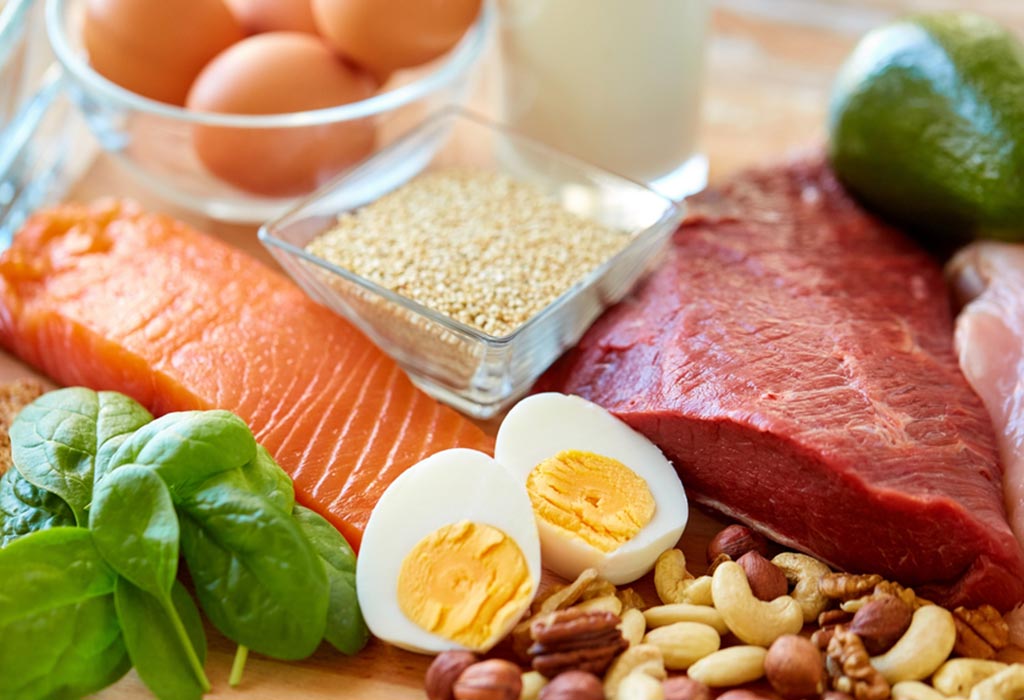

At five weeks you have entered into your second month of pregnancy. Many women don’t know they are pregnant yet but those who do, must take extra precaution in terms of their diet.The second month is as crucial as the first month, and a lot of caution has to be taken at this preliminary stage. Nutrition is of primary importance at this stage as the foetus develops the neural tube which later develops into the baby’s brain, spinal cord and nerves. The foetus also develops the basic circulatory system and heartbeat at this stage. A diet enriched with vitamins, minerals, proteins and other nutrients is mandatory at this stage. Read on to find out a complete description of the kind of foods to eat and avoid at this stage.
Important Nutrients You Should include in Your 2nd Month Pregnancy Diet
Food to eat when pregnant during the first trimester are the ones that support the development of the baby. Morning sickness and nausea may not help you in eating well, but you could definitely try taking as many nutrients as possible as part of your 2nd month pregnancy food diet. Some vital nutrients and food that should be included in your diet:
Folic Acid: An integral part of the 7-week pregnancy diet, folic acid serves the purpose of Vitamin B. A daily folic acid supplement of 5 mg is recommended when you are trying to get pregnant and for the first trimester. Folic acid helps to protect the unborn baby from developing neural tube defects. Green leafy vegetables, eggs, fruits, dry fruits (almond, walnuts), pulses and lentils are all rich natural supplements of folic acid for a pregnant woman.
Iron: Another essential nutrient of the 5th-week pregnancy diet, iron is mandatory for a healthy blood supply. At this stage, a mother needs a strong blood flow in her body to give the strength to sail through her morning sickness and fatigue that accompanies her pregnancy. Stick to foods that are rich in iron like fruits, vegetables like spinach, fenugreek and beetroot, chicken, fish and dry fruits.
Calcium: An important mineral during the second month, a 1000 mg intake of calcium is imperative for a mother. The bones of the foetus ossify at this stage, and if the body is not supplied with the required amount of calcium, it will be extracted from the existing reserves increasing chances of osteoporosis. Vegetables like turnip, cabbage, leafy vegetables are all excellent sources of calcium.
Proteins: Protein is essential from the onset of pregnancy. Poultry food like chicken, eggs, milk and fish and lentils provide the necessary protein requirement for the body. A minimum of 75gms of protein is needed by an expectant mother at this stage.
Zinc: Zinc is needed for acid metabolism and biological functions. Chicken, fish, vegetables and beans are all rich sources of zinc and make sure your diet is supplemented with these on a regular basis.
Fats: Fats are not always bad, but it is the kind of fat that you consume that will determine the healthy growth of your baby. There is no doubt that fried foods and foods containing saturated fat are detrimental to the baby and you. But a healthy intake of good fat in the form of ghee and cream will aid in the development of the eyes, brain, placenta, growth of tissues and also restrict any abnormality during childbirth.
Fibre: An important ingredient to aid digestion and prevent constipation, fibre in the diet is highly recommended. A fibre rich diet made up of vegetables like carrot, cabbage, cereals, fruits like oranges and bananas will help to maintain blood pressure and reduce any risk during pregnancy. A minimum intake of 14gms every day is recommended.
Foods that Should be Avoided during Second Month of Pregnancy
The foods that should be avoided include:
Meat Spreads: Meat Spreads contain Listeria that is harmful during this stage of pregnancy. They affect the growth of your baby and must be completely avoided.
Soft Cheese: Consumption of soft cheese like Brie and Camembert are not recommended as it could contain the E Coli bacteria leading to complications in pregnancy.
Raw Eggs: Raw eggs could spread the salmonella bacteria through the body causing a detrimental effect on you and can seriously hamper the normal development of the baby. Eggs must be completely boiled or poached when you are consuming it and even half boiled or semi-cooked eggs are not preferred.
Processed Meat: Processed meat is stored on the shelves for long and run a risk of carrying bacteria that are harmful to the baby and you. It is recommended to stay away from processed meat during pregnancy to avoid deterioration of health.
Raw Fish: Seafood like crabs, prawns, shrimp etc. contain elements called mercury that could lead to a miscarriage. They are not rich in protein and do not provide the body with any necessary nutrition.
Unpasteurized Milk: Do not consume unpasteurized milk. Unpasteurized milk contains microorganisms, pathogens and salmonella that are harmful to your body and the growth of the baby.
Alcohol: Alcohol is strictly not permitted as it could lead to several complications to your health and most important the growth of the baby. Always stay away from alcohol especially through your entire pregnancy.
Consume fresh fruits, vegetables, fully cooked food, proteins to build your muscles and give you energy. Consume more starchy food than sugary foods to increase your calories.
Diet Tips to Follow in 2nd Month of Pregnancy
Diet plan for the morning: You will get the entire benefit from the food you eat if you take it at the right time in the right proportion. Try to eat a well-balanced meal in the morning comprising of fruits, vegetables, cereals, dairy products like milk. Eating a slightly rich diet in the morning helps as it will have more time to digest itself.
Diet plan for the afternoon: Salads will help you feel fresh and energetic. You could also try including boiled eggs to your lunch. A plate with whole wheat toast , cooked and grilled meats, brown rice and lentil soup will be a complete nourishing meal at this stage.
Diet plan for the night: Given that you may still have morning sickness, keep your dinners light. Simple dinners could include boiled and cooked vegetable with less spice and salads.
If you feel peckish, try eating small portions of healthy snacks like rice crackers, hummus, taboula and salads etc. Avoid fried food and be guided by your appetite. Do not binge eat as many would keep insisting that you need to eat for two. Contrary to the popular belief, you breathe for two and not eat for two. You must eat for just one and healthy enough to sustain two!
Remember, your nutrition gain depends on the foods you choose, so choose wisely. Make sure you limit your intake of fatty foods, sugary foods, fried foods and foods high in calories as they provide no nutrition to your baby. Folic acid is vital for the development of the foetus, and you must eat food rich in folate in addition to supplements prescribed by the doctor.
Third Month of Pregnancy Diet (9-12 Weeks)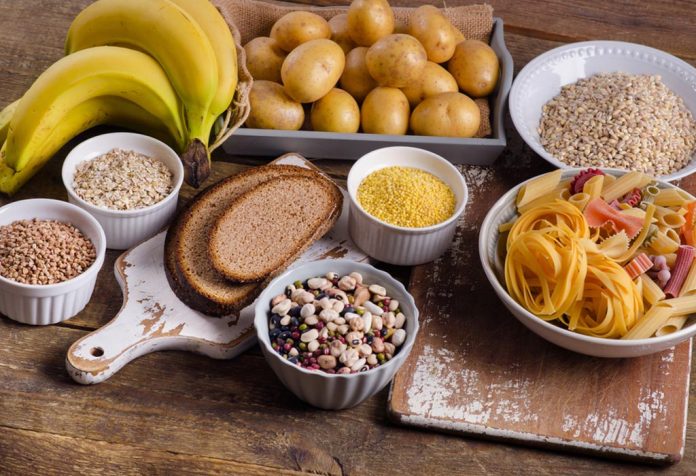

The third month of pregnancy (9-12 weeks) can be a difficult time for the mother-to-be, as the morning sickness, fatigue and mood swings can increase tremendously. This is also the time when the greatest number of miscarriages have been reported. It is, therefore, very important for the mom-to-be to remain stress-free. She should also eat nutritious food to ensure the healthy growth and development of the baby. The diet during the third month of pregnancy plays a crucial role in determining the health of the foetus.
3rd Month of Pregnancy Diet - What Foods to Eat
Your pregnancy diet in the first trimester should provide all the nutrition the foetus needs to grow into a healthy baby. Are you wondering what to eat during the 3rd month of pregnancy to have a healthy baby? Here is a list of foods you should include in your 3rd month pregnancy diet chart:
1. Vitamin B6-Rich Foods
In the third month, the morning sickness may peak at week 9 and will start decreasing by the end of week 12. Vitamin B6 helps combat nausea and vomiting. Examples of vitamin B6-rich foods include lean meats, poultry, eggs, citrus fruits, legumes, soybeans, nuts, seeds, and avocados.
2. Folate-Rich Foods
Folate or folic acid is very important for the proper development of the baby’s brain and spinal cord. Even if you are taking folic acid supplements, it is good to include natural sources of folate-rich foods in your diet. Examples of folate-rich foods are broccoli, citrus fruits, beans, peas, lentils, avocado, Brussels sprouts, okra, asparagus, and dark green leafy vegetables like spinach and kale.
3. Omega-3-Rich Foods
Omega-3 fatty acids are essential nutrients that are necessary for the healthy development of the eyes and brain in the baby. Foods rich in Omega-3 fatty acids are soybeans, canola oil, walnuts, chia seeds, flaxseeds, salmon, mackerel, sardines, and wild rice.
4. Fresh Fruits
Fruits contain a wide range of nutrients and antioxidants that are essential for the baby’s healthy growth and development. Fresh fruits are a better source of nutrients than fruit juices and canned or frozen fruit. Include plenty of muskmelon, avocados, pomegranate, bananas, guava, oranges, sweet limes, strawberries, and apples in your diet.
5. Vegetables
Healthy food for a 3-months-pregnant lady should include at least 3 cups of vegetables per day. Choose different coloured vegetables and mix them up to ensure you get a wide range of nutrients and tastes. Examples include kale, spinach, broccoli, sweet potatoes, tomatoes, carrots, pumpkin, bell peppers, corn, eggplant, cabbage, etc.
6. Carbohydrates
Carbohydrates provide the energy source for our body. Complex carbohydrates are found in foods like whole grains, legumes, and starchy vegetables like potatoes and sweet potatoes take longer for our body to break-down and metabolise. This helps in providing steady amounts of energy. Simple carbohydrates from natural sources like fruits and vegetables that contain fibre are also good for your growing baby. Avoid simple carbs found in processed foods like refined flour, cookies, and cakes. These are just empty calories and are bad for the baby.
7. Proteins
Proteins are the building blocks of DNA, tissue, and muscles. They also play an important role in triggering enzymes in our body. Proteins are therefore essential for the proper development of the foetus. Examples of proteins are legumes, quinoa, seeds, lentils, chicken, nuts, nut butter, meat, and soybeans.
8. Dairy
Dairy products are an excellent source of calcium, which is very important for the development of strong and healthy bones. Examples include milk, yoghurt, and hard cheeses. If you are allergic to dairy, other sources of calcium-rich foods are kale, watercress, and sardines.
9. Vitamin D
Vitamin D plays an important role in the development of the immune system, healthy teeth and bone development, and healthy cell division in the baby. Examples of vitamin D-rich foods are fatty fishes like salmon, mackerel and tuna, egg yolk, cod liver oil, and vitamin D fortified milk or cereals.
10. Zinc
Zinc is an essential mineral that is important for the development of a healthy immune system and nervous system. Foods rich in zinc include beef, spinach, wheat germ, mushrooms, oysters, lamb, pumpkin and squash seeds, chicken, nuts, and beans.
Foods to Avoid during Third Month of Pregnancy
These are the foods that should be avoided in the third month of pregnancy:
1. Seafood
Seafood and ocean fish contain high levels of methyl-mercury that causes impaired brain function in the foetus. So, avoid seafood and stick to freshwater fish.
2. Raw Eggs and Unpasteurised Dairy Products
Raw eggs can contain Salmonella bacteria that can cause food poisoning. Unpasteurised dairy products like soft cheeses can contain listeria which also causes serious food poisoning. Hence, avoid raw eggs and unpasteurised dairy products.
3. Raw Or Undercooked Meats
Raw and undercooked meats can contain bacteria that cause food poisoning and serious damage to the growing baby.
4. Vitamin A
Excessive amounts of vitamin A have been linked to birth defects. The vitamin A found in natural foods like fruits, vegetables, eggs and milk is not harmful. However, liver from beef, chicken or veal contains high amounts of vitamin A. It is better to avoid these to ensure you do not get too much vitamin A at once. Also, avoid taking vitamin A supplements.
5. Caffeine
Caffeine present in coffee, tea and aerated drinks can cross the placenta and cause increased heart rate in the baby. So, it is better to limit or avoid caffeine.
6. Street Food
Eating street food increases the chances of getting bacterial infections such as gastroenteritis. Such infections will harm the developing baby. Hence, it is best to avoid street food.
7. Canned Or Tinned Foods
Canned foods contain high amounts of preservatives which can harm foetal development. They also contain a chemical called bisphenol-A (BPA) which has been linked to an increased risk of miscarriages. Hence, avoid canned or tinned food and eat homemade food cooked with fresh produce.
3rd Month Pregnancy Diet Tips
Stay Hydrated – drink plenty of water. You can also have juices and soup, but water is best for hydration.
Include at least 5 portions or servings of fruits and vegetables per day in your diet.
Eat 5 to 6 healthy, smaller meals in a day rather than 3 large meals.
Avoid alcohol, tobacco and drugs completely as these can cause serious birth defects and developmental issues in your baby.
Take your doctor-prescribed nutritional supplements without fail.
Avoid modifying your diet without checking with your doctor first.
The third month of pregnancy may be tough as nausea and vomiting may peak at this time. However, the morning sickness starts to lessen by week 12 and is usually gone by the start of the second trimester. Follow the diet tips in this article to provide the necessary nutrition and encourage the healthy growth and development of your baby.
Fourth Month Pregnancy Diet (13-16 Weeks)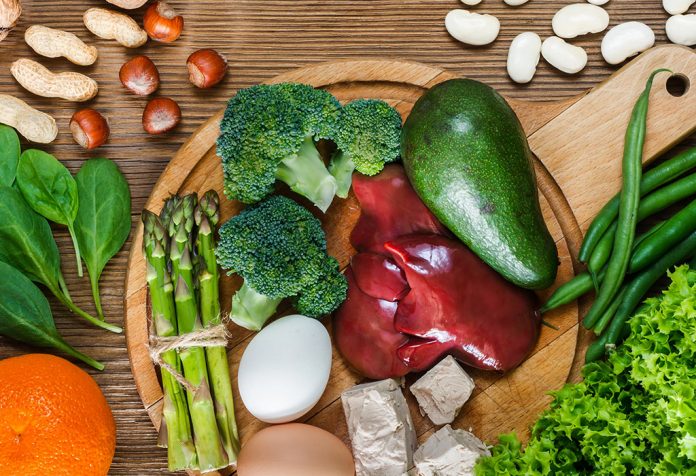

The fourth month of pregnancy is a time when the unpleasant side-effects such as headaches, morning sickness, and mood swings disappear. You may not feel strong food aversions after the first trimester, and you may have food cravings. The second trimester is regarded as the most comfortable of the three trimesters. This is also the period when your baby grows the most, and your blood volume increases so that the baby can get nourishment from the nutrients absorbed by your blood. Hence, your diet during the fourth month of pregnancy should include all the nutrients that are required for the baby’s healthy growth and development.
What to Include in your Fourth-Month Pregnancy Diet?
It is important to plan what to eat during the second trimester of pregnancy. Your 4th month pregnancy diet chart should include the following:
1. Iron-rich Foods
As your blood volume increases in the 4th month, you should include iron-rich foods to meet the higher level of iron requirement. Examples of iron-rich foods are meat, fish, tofu, liver, soybeans, whole grains like brown rice, nuts and seeds, dark green leafy vegetables like kale and spinach, dried fruits, and eggs.
2. Fibre-rich Foods
In the fourth month of pregnancy, the hormone progesterone slows down digestion. Your uterus starts to grow in size to accommodate your growing baby. This causes constipation. To prevent constipation and stimulate regular bowel movements, you should eat foods rich in fibre. Examples include whole grains like oatmeal, bran, and barley, seeds like flaxseeds and chia, nuts like almonds, pecans, and pistachios, vegetables like Brussels sprouts, broccoli, sweet corn, artichokes, and green peas, and fruits like raspberries, strawberries, figs, apples, bananas, and pears.
3. Calcium-rich Foods
Calcium is very important for the development of strong bones in your baby. Foods rich in calcium are kale, milk, yoghurt, cheese, sardines, watercress, broccoli, okra, and almonds.
4. Foods Rich in Zinc and Vitamin C
Zinc is a trace element essential for building proteins, and the development of a healthy nervous system and immune system. Foods rich in zinc include oysters, lamb, beef, spinach, wheat germ, mushrooms, pumpkin and squash seeds, nuts, chicken, and beans. Vitamin C is essential for the absorption of iron in the body. Foods rich in Vitamin C are green and red peppers, tomatoes, sweet potatoes, broccoli, Brussels sprouts, cauliflower, cabbage, and leafy greens.
5. Foods Rich in Omega Fatty Acids
Omega-3 fatty acids are essential for eye and brain development in the foetus. Omega-6 fatty acids are important for heart health, proper functioning of the reproductive system, and skin, hair and bone growth. Foods rich in omega fatty acids include vegetable oils, salmon, sardines, soybeans, nuts like walnuts and almonds, and seeds like chia and flax.
6. Fruits and Vegetables
It is important to include at least five portions of fruits and vegetables per day. Fresh produce has the highest level of nutrients, followed by frozen. You should also include some raw vegetables in the form of a salad. Fresh fruit is healthier than fruit juices.
7. Proteins and Carbohydrates
Proteins are the building blocks of muscles, tissues, and DNA. Carbohydrates are the energy source for our body. Include adequate amounts of proteins and starchy carbohydrates in your diet. Examples of proteins are legumes, lentils, nuts, seeds, nut butter, meat, chicken, quinoa and soybeans. Examples of starchy carbohydrates are potatoes, rice, pasta and bread. A diet during the pregnancy’s 4th month should, therefore, include lentils and lentil soups, whole wheat breads, porridges made from oats, grilled meats and chicken, Hummus (chickpeas) and red kidney beans.
Fourth Month of Pregnancy - What Not to Eat?
There are some foods which may harm the baby if eaten during pregnancy. Here is a list of foods to avoid during the 4th month of pregnancy:
1. Liquorice
Consuming excessive amounts of black liquorice during pregnancy has been linked to lower IQs in the babies. Liquorice also contains chemicals that can trigger uterine contractions, causing preterm labour. Hence, it is best to avoid foods containing liquorice.
2. Refined Flour
Refined flour is difficult to digest and can cause constipation and lead to haemorrhoids post-delivery. It also spikes up blood sugar levels as it has a high glycaemic index. This can lead to gestational diabetes, which is harmful to both the mother and baby. Stick to whole-wheat foods and avoid refined flour.
3. Ocean Fish
Ocean fish like white tuna, king mackerel, and swordfish contain high levels of mercury. The mercury can cause brain damage in the foetus and has been linked to mental retardation in babies. So, avoid ocean fish and stick to freshwater fish like salmon or trout.
4. Blue Cheese
Blue cheese like Camembert and soft cheeses like Brie may contain microorganisms like bacteria or listeria that can cause food poisoning in the mother. This will affect the baby’s health and development. So, avoid blue cheese and soft cheeses, and eat only hard cheeses like Parmesan or Cheddar.
5. Raw Eggs and undercooked Meat
Raw eggs may contain salmonella bacteria that can cause salmonellosis, a kind of food poisoning. This can harm the baby. So, eat only cooked eggs. Undercooked meat can also cause food poisoning, so make sure meat is thoroughly cooked.
6. Pâté
Pâté is a mixture of cooked ground meat and fat in the form of a spreadable paste. Any type of pâté has a risk of listeria infection. Hence, it is better to avoid pâté during pregnancy.
7. Caffeine
Excess consumption of caffeine increases your heart rate and also causes nervousness, irritability and sleeplessness. It can be harmful to the baby and has also been linked to miscarriages. Hence, it is better to limit caffeine intake to 200 milligrams per day.
Diet Tips for the Fourth Month
Here are some diet tips to follow during the fourth month of pregnancy:
Drink enough water. A pregnant woman, on average, requires around 2.3 litres of water per day.
Avoid eating excessive quantities of fried food, spicy food or food containing high amounts of salt or sugar.
Ground flaxseeds can be sprinkled over your salads or in oatmeal, yoghurt, etc. They are a great source of dietary fibre and omega-3 fatty acids.
Do not eat too many sweets as it will lead to gestational diabetes and unnecessary weight gain.
Avoid having tea or coffee with meals and iron supplements as the tannins present in them can prevent iron from being absorbed by the body.
Make sure the fruits and vegetables are thoroughly washed to remove germs, soil and pesticide residues.
The fourth month of pregnancy is a comfortable time for the mother-to-be. Regular exercise, healthy food, and remaining stress-free and calm at this time will ensure that your baby is healthy. Make sure you consult your doctor for advice before making any changes in your diet.
6
Fifth Month of Pregnancy Diet (17-20 Weeks)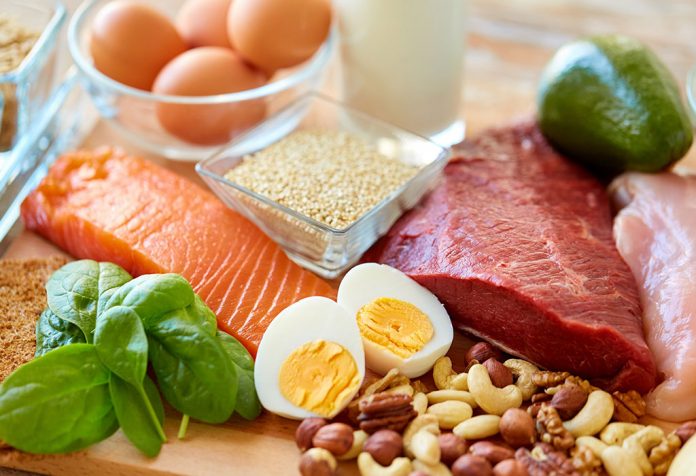

Almost every woman looks forward to being a mother and pregnancy is only the beginning of this great adventure. It is during this time that a woman needs to be very cautious and strict with her diet. During your fifth month, you will need to consume at least 347 extra calories per day and gain about one or two pounds of weight. These calories should come from protein and calcium sources. Do everything you can to avoid getting them from fatty additives, sugar and carbohydrates.
What to Eat in the Fifth Month of Pregnancy?
We have listed here some foods that you should include in your 5-month pregnancy diet chart:
1. Protein Rich Food
Foods rich in protein ensure that your baby’s physical development is going smoothly as the amino acids in protein are the building blocks of the body. Pulses, cereals, seeds and nuts, chickpeas, cottage cheese and tofu, are some foods that are good sources of protein for you and make great 5th month pregnancy food.
2. Whole Grains
These are very rich in magnesium, iron, vitamin E and Vitamin B complex. Whole grains consist of all three parts of the grain, which are the endosperm, bran and germ. Breakfast cereals, wheat flour, bread and so many other things are made from whole grains.
3. Calcium Rich
We all know that calcium is good for our bones and teeth and it is no different for your developing baby. Make sure to intake plenty of calcium to ensure a strong skeletal system for your child. Fruits like kiwi, mulberries, dried figs and dates are rich in calcium.
4. High Fibre
Constipation is a well-known problem during pregnancy. Foods rich in fibre are the best way to reduce the chances of it happening. Fruits and vegetables, barley, oats, wheat and nuts are some foods that are rich in fibre.
5. Eat Lots of Salad
Get into the habit of eating salads if you don’t already. You can get quite creative with salads, and they are a great way to get the essential nutrients, minerals and fibres your body will need. Avoid using salad dressings and pickled vegetables, however, as these are high in sodium content.
6. Eat Lots of Fruits
Apples, grapes, bananas, avocados, pears, oranges, peaches and so many more! There are so many fruits to choose from that it can be difficult to get bored of them. They are also high in minerals and vitamins, and it is an important food to eat during the second trimester of pregnancy.
7. Stay Hydrated
Staying hydrated has so many benefits to the human body and during pregnancy is all the more important. It keeps constipation and urinary tract infection at bay, two common problems faced by pregnant women. Drinking a lot of fluids also helps to detoxify your body. If you are someone who doesn’t like to drink plain water, drink fresh juices like sugarcane and mango which contain healthy carbohydrates and fibre.
What Not to Eat during the Fifth Month of Pregnancy?
Though you may have cravings, here are some things that you should stay clear of during your pregnancy:
1. Carbonated Drinks
Fizzy drinks have a lot of unhealthy calories, sugar and caffeine. Ditch these for some fresh fruit juices or stick to fresh lime water.
2. Certain Fruits and Vegetables
Avoid fruits such as pineapples, pomegranates and papayas, which are known to cause uterine contractions which lead to miscarriages. It is best to also avoid black grapes as they build up the heat in your body, which can be harmful to your baby.
Vegetables like cabbage and lettuce are known to carry foodborne illnesses, while eggplant is known to stimulate menses which may cause abortions in pregnancies.
3. Caffeine
Too much caffeine during pregnancy causes restlessness and sleeplessness in babies after they are born. Tea, coffee and chocolate contain caffeine and so it is best to avoid it altogether, but if you are someone who feels you really cannot go without, reduce the quantity to a maximum of two cups per day.
4. Smoked and Raw Seafood
If you love sushi and sashimi, it is time to take a break. Smoked seafood most often contains bacteria called “Listeria monocytogenes bacteria” which causes listeriosis, leading to stillbirths, miscarriages or illnesses in new-borns.
5. Fish Containing Mercury
Mercury is a substance that is found in the ocean, streams and lakes. It converts into methylmercury inside the human body, which is a neurotoxin and may cause brain damage and developmental delays in infants. Fish like shark, swordfish, king mackerel and tilefish are some fish to avoid. Go for salmon or light meat tuna.
6. Raw or Undercooked Eggs and Meat
Unless you are vegan, eggs and meat are bound to be a huge part of your diet. Make sure you never have any raw eggs or meat and that they are always well-cooked.
Raw eggs contain bacteria called “salmonella” which causes food poisoning. While your bout of food poisoning may not harm your baby, your immune system will be weakened, and that can have a negative impact on your baby’s development.
Raw meat contains the toxoplasma parasite which can lead to fetal death during delivery or miscarriages during pregnancy.
7. Herbal Teas and Supplements
There are certain herbal ingredients that are used in tea, seasonings or supplements which could be very harmful to mother and child. Ingredients such as angelica, mugwort, black and blue cohosh and others act as uterine stimulants and should be avoided completely.
Herbs such as black walnut, fenugreek, horsetail, liquorice root senna, wormwood and others can cause miscarriages. Other herbs such as ginseng, aloe and primrose are also not safe to consume.
Diet Tips for a 5-Month Pregnant Women
Here are some tips for maintaining a balanced diet during this crucial time of your life:
Research the nutrition content of the food that you eat on a daily basis and try to work out how much you need to consume every day and what part of your diet needs to be changed if any.
Set up a meal plan for yourself to ensure your body is getting the right amount of nutrients that it requires to grow your baby.
Consult with your doctor about any food items in your meal plan that you may be allergic to and what you can substitute it with.
Eat less quantities in one sitting and more frequently throughout the day.
Choose dried fruits, nuts and seeds if you feel the need to munch on something. You can also have baby carrots and other vegetables as snacks between meals.
Your height and weight before pregnancy will be important when it comes to how much of each food group you need to eat in order to maintain a healthy and balanced diet. For this, it is always best to get the advice of your doctor or a nutritionist.
It may be difficult to suppress some of the cravings that you may get for good old street food every now and then but try not to indulge for the sake of your baby. In fact, try to keep all your unhealthy food cravings under control or substitute them with the healthy food that will be beneficial for both you and your baby. What you consume will have a direct impact on not just you, but also your baby. Nothing is more important than the health and safety of your baby so always remain aware and cautious of what you are consuming.
Sixth Month of Pregnancy Diet (21-24 Weeks)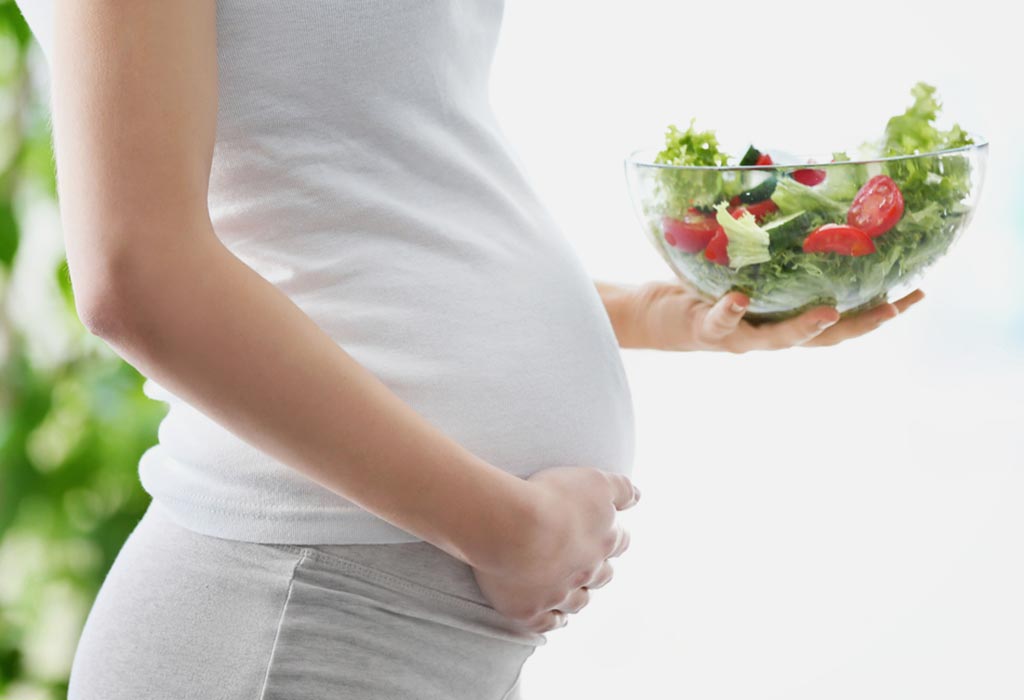

As you move into your 6th month of pregnancy, you will notice that your developing baby grows more used to a routine of activity and rest. Meanwhile, you yourself will experience a host of bodily symptoms from hands and feet swelling to lower back pain, gastric issues, increased vaginal discharge and even bleeding gums.
Foods to Include in 6th Month of Pregnancy Diet
You will have begun experiencing hunger like you haven’t felt it before – both frequently and intensely. Here is a list of what to eat in 6th month of pregnancy
1. Vitamin C
Due to the high volume of blood in your body at this stage of pregnancy, you may begin experiencing bleeding from your gums. If the condition worsens, it could lead to gingivitis. Consume a high amount of Vitamin C during this month as it is essential in repairing and maintaining connective tissue all over the body including tissue that binds teeth to the gums and the jaw bone.
Citrus fruits such as oranges, lemons and tangerines are rich in Vitamin C. Other sources are strawberries, grapes, cabbage and sweet potato.
2. Vegetables
The further your pregnancy progresses, the more you are vulnerable to constipation and indigestion. In certain studies, it has been seen that about 85% of women could experience haemorrhoids during the course of pregnancy. Fibre, found in vegetables is always an essential part of 6th month of pregnancy food chart as it provides roughage which aids regular, healthy bowel movements.
Along with providing good amounts of fibre, different vegetables are rich in various types of vitamins and minerals.
3. Fluids
Remember that as a pregnant mommy, you are not just eating for two but also drinking for two. Staying hydrated requires a minimum of 8 glasses of water a day. In addition, you should also get some smoothies and juices into the mix for your overall wellness. Staying hydrated is one of the underrated elements discussed when talking about food for 6-month pregnant woman. Fighting constipation is essential, so drink up!
4. Folic Acid
Folic Acid is a complex vitamin. It is necessary for the building of new cells. It is especially important to incorporate sources of folic acid into foods to eat during the second trimester as your foetus’ brain undergoes rapid development towards the end of 24 weeks.
Foods rich in folic acid are whole grain bread and cereals, green vegetables (broccoli, spinach and lettuce), flax seeds, sunflower seeds, pumpkin and sesame seeds, peanuts and almonds. It is also found in certain fruits and vegetables such as okra, peas, grapes and bananas.
5. Protein
Being the building blocks of cells, protein is always welcome. Also, unlike carbohydrates proteins do not readily convert into fats to be stored for later use.
Foods rich in protein are dairy products, eggs and lean, white meat. Other sources of protein that are very healthy are legumes and pulses.
6. Carbohydrates
Like proteins, carbohydrates are an essential nutrient for daily life. Carbohydrates are burnt by the body for energy. Excess carbohydrates are converted to fat and stored in cells.
Refined carbohydrates like polished rice (without the husk) and white bread quickly break down into sugars, leading to spikes in blood glucose level. Hence it is wise to stick to whole grain bread and brown rice. Wheat, oatmeal and cereals are also good sources of carbohydrates.
7. Fruits
Fruits provide a variety of vitamins, minerals and essential roughage to help digestion. Also, since water is a major constituent of most fruits, it helps you stay hydrated.
Consuming a large variety of fruits can help ensure you are getting all the micronutrients you require. For example, Pears contain phosphate, vitamin C, potassium and copper; Apples contain antioxidants, B-complex, iron and phytonutrients; Bananas contain potassium, B-6 vitamin and vitamin C, etc
Foods to Avoid during Sixth Month of Pregnancy
There are foods that are part of the course normally, that could have adverse effects on your and your baby’s health during pregnancy!
1. Seafood
Craving for raw seafood, such as sushi, has been reported by pregnant moms. Most seafood contains trace amounts of mercury as compounds containing mercury (methylmercury) are not easily decomposed in saltwater but are broken down by the action of vegetative matter in freshwater. While adult bodies may not be affected adversely by small amounts of mercury, it is best to avoid contact during pregnancy as your baby’s brain is still in its early stages of development.
2. Caffeine
High caffeine intake has been linked to restlessness and sleeplessness in newborns. Caffeine intake by the mother will increase the foetus’ heart rate and increase its chance of developing a dependency. Also, since a foetus has no developed system to detoxify, the caffeine stays in its system for longer than it may for a grown up.
3. Soy
Phytoestrogens are compounds found in Soy and certain herbs used to boost fertility. Phytoestrogens take on the role of natural estrogen and bind with estrogen receptors. This makes it a useful ad for women attempting to conceive. However, if you are already pregnant, these false hormones can adversely affect the development of your baby’s brain, sexual organs and immune system.
4. Fast Food
Lots of pregnant women report getting a sudden craving for greasy fast food. Indeed, lots of people in general, male or female, pregnant or not, get sudden cravings for fast food! The high amount of calories in fast food can cause your blood glucose levels to spike and later, drop. These extremes can cause irritability, tiredness, and in the long term, impairment of vital organs.
Fast food can contribute to “gestational diabetes”, which is a condition where pregnant women develop a high blood sugar level. If left unchecked this could lead to permanent health issues in their children.
5. Undercooked Meat
Always make sure, when eating chicken or other meats, to consume only well-cooked food. If undercooked, bacteria is Listeria Bacterium, found in meat could be transferred into your body, causing Listeriosis. Listeriosis is food poisoning that can result from eating contaminated vegetables, undercooked meat and unpasteurised dairy products. In pregnant women, it can lead to miscarriage.
6. Spicy Food
Spicy foods are not unsafe for your growing baby. However, during the later stages of pregnancy, it can cause heartburn, indigestion and general discomfort; all of which, pregnant women are prone to.
7. Alcohol and Tobacco
It is well known that tobacco and alcohol should be avoided at all times and need to be completely avoided during pregnancy. In fact, avoiding these drugs is recommended even when trying for conception! These drugs can severely retard the development of your foetus.
Diet Tips for 6 Months Pregnant Woman
Avoid taking any over-the-counter medications.
If there are regular medications that you take, it is of the utmost importance that you consult with your doctor on their use during pregnancy.
Cravings are a natural part of pregnancy! Create a habit of indulging in healthy cravings like fruit and vegetables!
Craving for greasy fast food is normal during pregnancy and otherwise. Only indulge these cravings once or twice a week and try to keep it down to small portions.
Satisfying a craving is hard work. After finishing a small portion of fast food or other oil and grease heavy food, do not refill your plate immediately. Sitting down and waiting for 4 minutes or more can curb your desire to get a refill, as it takes some time for your stomach to signal to your brain that it is full and doesn’t need refreshment.
A balanced diet leads to a healthy mommy, and a healthy mommy creates a healthy baby!
Seventh Month of Pregnancy Diet (25-28 Weeks)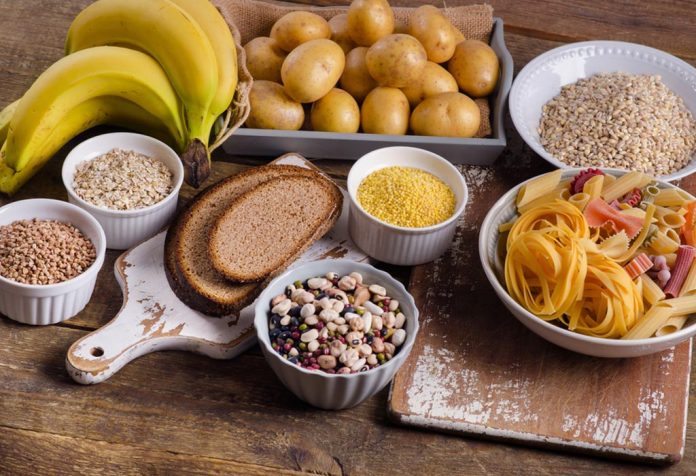

The third trimester, the last leg of your pregnancy, you are slowly inching to that most awaited day. Your body and your baby are going through tremendous changes. You will start to look big, and you will be tempted to go on a diet to temper your weight gain. Rather than diet, try and structure your diet in a way that will work around the needs of your nutrition at this stage and also keep a check on your weight. Your stomach with rumble more than often as your baby is now preparing for its life once it is outside. Health experts recommend that at least an additional 450 calories to ensure that your baby gains from nutrition needed at this stage. So, the big question is, what should you eat to strike this balance between nutrition and weight control? There are plenty of options. Read on to find out.
What Foods to Include in Seven Month Pregnancy Diet?
A healthy third trimester diet during pregnancy has many elements. Your food plan need not be dull but must include all the nutrients. The key factor is to eat in moderation! Avoid all temptations to overeat especially because you will feel severe hunger pangs during this period. Learn more about what foods to eat during the 7th month of pregnancy.
Iron & Protein Rich Diet: An extra dose of iron is essential to avoid anaemia, haemorrhage during delivery or even premature delivery. You would need approximately 27 mg of iron every day. Dark green vegetables like spinach, turnip leaves, dried fruits like raisins and apricots, pumpkin and sesame seeds, soya beans, red meat and poultry are all iron rich foods that you can include in your diet. Protein is also important for healthy growth of your baby. The amino acids present in protein-rich foods like eggs, meat, lentils, chickpeas, pulses and dairy products will provide you with the recommended 75-100 gms of protein a day.
Calcium-rich Diet: Intake of calcium during pregnancy in the 3rd trimester is considered very crucial. Calcium in your diet aids in the healthy development of your baby’s skeletal system and a robust bone structure. You must aim at a 1000 gm intake of calcium every day through your diet. All dairy products like milk, cheese, laban and yoghurt are rich in calcium.
Magnesium-rich Diet: For all the calcium you devour, you would need a proportionate amount of magnesium for your body to assimilate it. Magnesium alleviates leg cramps, relaxes muscles and also prevents premature delivery. For every 1000 gm of calcium you devour, you need an intake of 400mg of magnesium. Black beans, oat bran, barley, artichoke, almonds and pumpkin seeds are rich sources of magnesium.
DHA enriched Diet: A fatty acid, DHA is essential if you want a kid with brains and brawns. A daily intake of 200 mg is recommended for the development of the baby’s brain. Fish oil, fatty fish like tuna, walnuts and flax seeds are all loaded with DHA.
Folic Acid: Folic acids reduce the risk of any neural tube defects and aid in the development of a healthy neural system. Eat at least 600mg -800mg of folic acid rich food in a day. Supplement your diet with dark leafy vegetables, oranges, oatmeal, whole grain bread and fortified cereals to get the recommended dose.
Fibre rich Diet: A fibre rich diet helps to clean the bile and prevent constipation. The water in your digestive tract is absorbed by your fibre intake so make sure you drink lots of water. Constipation is common in the third trimester so include, fresh fruits and vegetables, legumes and whole grains to your diet.
Vitamin C: Increasing your intake of Vitamin C will help in the proper absorption of iron-rich. Citrus fruits like lemons, oranges and melons, green pepper and broccoli are rich sources of Vitamin C.
Foods to Avoid in Seventh Month of Pregnancy
Just when you know what to eat, bear in mind it is equally important to know what not to eat during this stage. Heartburn, swollen feet and hands, fatigue and constipation, are some common symptoms you will experience at this stage. Certain foods will certainly aggravate these issues, and it is better to eliminate them from your diet.
High fat and Spicy Food: Foods high in fat and spice, especially fried food will increase the discomfort of heartburn. They are difficult to digest and may hinder your sleep. Avoid fried foods in the night.
Restrict intake of Sodium packed Foods: It is important to keep a check on your sodium intake at this stage of pregnancy. High consumption of sodium will lead to swelling and bloating. Avoid crisps, pickles, sauces, canned food and ketchup. Drink plenty of fluids and water to regulate your sodium levels in your body.
Say no to caffeine and fizzy beverages: Try to avoid drinking coffee and tea. Restrict yourself to just one cup a day as it could lead to constipation. Fizzy drinks are loaded with artificial sugar and sweeteners and provide absolutely zero nutrition.
Alcohol: Alcohol is definitely not recommended at any stage of your pregnancy. At this stage, it is imperative that you do not even think of consuming it as it could hinder your delivery process.
Junk Food: You may crave for that fried chicken from KFC or the huge tempting burger at McDonald’s, but it would help if you stay away. Indulge to a restricted extent and opt for homemade snacks like sandwiches, rice cakes, hummus etc.
Diet Tips for Seven Month Pregnant Women
Morning Diet: Include fresh fruits for your morning breakfast. Include some servings of fortified cereal for iron intake. You could even have some boiled legumes and beans for protein. Eggs, dry fruits and milk could be had on a daily basis. Eat a heavy breakfast as your body has all day to digest it.
Afternoon Diet:Lunch should include a balanced proportion of cooked vegetables, salads, bread, grilled and/or well-cooked meats or chicken and rice. Eat more starchy foods rather than sugary foods to increase unhealthy calories.
Dinner Diet: Keep your dinners light as you will want to avoid symptoms of heartburn and constipation. Stick to salads and fresh fruits to get a good night’s sleep.
A healthy and nutritious diet not only benefits you but your baby too. Since you are now getting bigger, it is a good idea to get some exercise to offset the calories that you intake and control weight gain. Parental yoga, swimming, walking are great options to check weight gain and will keep you strong and fit for a normal delivery.
Eighth Month Pregnancy Diet (29-32 Weeks)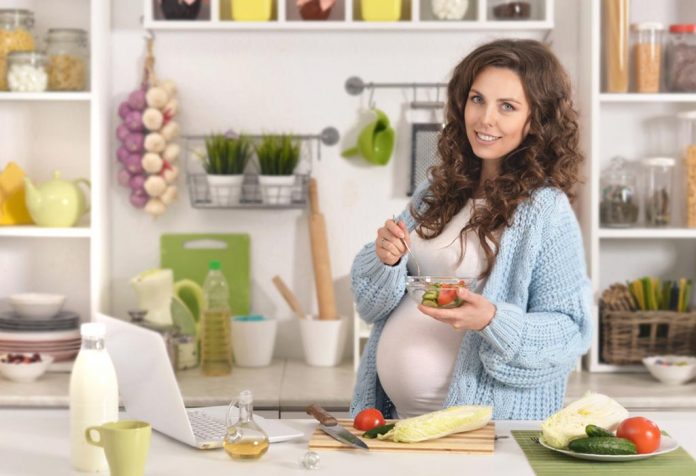

An important aspect to care for during pregnancy is the diet. It can have a telling effect on the health of the baby and also affect the mental and physical well-being of the mother in a number of ways. The diet needs to be created with utmost care, keeping in mind the effects of the food items on the growing baby.
Let us look at some foods which are to be avoided in the third-trimester diet and some food items which can be had safely, during the third trimester, or the eighth month of pregnancy.
What to Expect During the Eighth Month of Pregnancy
1. Gaining Weight
The fetus gains weight quite quickly during the eighth month, which means so will the mother. If you haven’t noticed much weight gain in the previous months, this month more than makes up for the delay.
2. Frequent Urination
As the baby grows larger, there is increased pressure on the bladder, causing you to pee more frequently. This may make many women drink lesser water, as constantly wanting to pee can cause discomfort. However, it is vital to stay hydrated during pregnancy, so be smart about your intake of fluids by eating fruits with a high water content, drinking lesser water at night, etc.
3. Shortness of Breath
The mother’s enlarged uterus pushes against the diaphram, a muscle involved in breathing, causing shortness of breath. It is advised to wear looser clothing to feel more comfortable
4. Heartburn or Acidity
As the uterus grows quite a bit during the third trimester, it puts pressure on the stomach and intestines, increasing the risk of acidity. Eating non-spicy, easier to digest foods relives this issue.
What to Eat during the Eighth Month of Pregnancy?
Below are some foods that can be eaten during this time:
1. Fish
Fish contains a large amount of iron, which is important during the last months of pregnancy. Iron deficiency results in anaemia, which can cause a feeling of general fatigue in the mother. Fish also has other important nutrients like protein and the likes, which makes it a great addition to the 8th-month pregnancy diet chart.
2. Red Meat
Red meat is another great addition to the diet of an expecting mother, as it is also a rich source of iron and protein. Both of these are essential minerals to the mother, as it helps accelerate the growth of the baby. Red meat can improve the general health of the mother too, as it contains minerals which keep you from being tired or sick during pregnancy.
3. Bananas
One of the most underrated fruits, bananas have been a great source of essential vitamins and minerals since ancient times. Bananas are rich in potassium, calcium and iron, making it a must-have in any woman’s diet. On top of that, they also promote digestion and relieve constipation, increasing the comfort of the expectant mother in great ways.
4. Dairy Products
There is a reason why dairy products are so heavily promoted among children during their formative years- dairy products, including milk are a non-exhaustive source of vitamins and minerals, including calcium, potassium, proteins and the likes. Consuming dairy products during the last month of pregnancy can have a telling effect on the growth of the baby.
5. Leafy Vegetables
Fibre enriched foods are important during pregnancy, as they help prevent the feeling of constipation which occurs due to the excess weight and excess hormone secretion during the third trimester. Leafy vegetables contain more than enough fibre, along with other minerals like iron, potassium and calcium to boot, too. They are a great addition to the 8th-month pregnancy diet of the mother.
6. Peanut Butter
Fat is also a necessity for the body during the final trimester, although many people seem to assume otherwise. While high fats are strictly off-limits, vital fatty acids still remain an important addition to the diet of the pregnant mother. Omega-3 is an example of a vital fatty acid, and this contributes greatly to the development of the brain of the foetus. Other sources, like peanut butter, include eggs and fish.
7. Oranges
Apart from having large amounts of fibre, oranges also contain a large amount of vitamin C, which is an essential nutrient for the body. Vitamin C is important as it is used to soak up the iron intake, so a deficiency can result in anaemia and fatigue for the mother. Other sources of vitamin C include tomatoes, lemons and cabbages.
Foods Not to Include in the Eighth Month of Pregnancy Diet
Here are foods that can cause harm to either you or the foetus:
1. Unpasteurized Milk
Unpasteurized milk directly from the cow or sheep has to be strictly avoided during the third trimester of pregnancy, as the milk is not processed enough to be deemed safe for consumption. Goat milk should also be avoided, as it contains a harmful element called toxoplasmosis.
2. Coffee
Caffeinated items are a strict no-no in the last stages of pregnancy, as they have the tendency to make the drinker constipated after consumption. You can instead opt to consume large amounts of water, which is a necessity even during normal times. Coffee is one of the third-trimester drinks to avoid, for any expectant mother.
3. Alcohol and Tobacco
It goes without saying that alcohol and tobacco must be avoided at all times and especially during any stage of pregnancy, even more so in the third trimester. They can cause complications at the time of delivery, and also have an impeding effect on the growth of the foetus inside the mother.
4. Fried Foods
Oil-fried food items are another category that you should avoid during your third trimester of pregnancy, as they add little to your diet in terms of nutritional value. Fried foods can also cause gastrointestinal problems, including improper digestion and heartburn, which can be extremely uncomfortable when you are carrying a child with you.
5. Shark, Marlin and Swordfish
These type of fish items must be avoided during pregnancy, as they have high levels of a detrimental substance called methylmercury. Methylmercury can cause complications in the development of the nervous system of the foetus, so choose fish that have the required nutritional value and are not too fatty for consumption.
6. Liver and Cured Meats
Liver and other cured meats must be avoided in the entirety of the pregnancy, not just in the third trimester. Cured meats like beef salami increase the risk of toxoplasmosis and listeriosis in the unborn child, making it strictly off-limits for any expectant mother during the time of pregnancy.
7. Soft Cheese
Cheese that has been ripened using a mould, like Brie has to be avoided during the time of pregnancy. Also, cheese like the Danish Blue which has blue veins often contain listeria, so they are also harmful to the health of the child during pregnancy. So, if mothers have a craving for cheese during the third trimester, opt for hard cheese like Cheddar and the likes.
Diet Tips for 8 Month Pregnant Women
Consume only food items that add nutritional value to your diet (no more chocolate cake!)
Consume fluids- they are important as they prevent constipation, while also increasing the bloodstream volume which carries vitamins and minerals to the mother and the child. So, make sure to drink water between each meal and snack, and eight swigs every time you see a water bottle.
Do not avoid seafood as a whole- even though they may contain harmful substances like mercury, you can still choose fish that are safe to consume during pregnancy. Fish contains omega-3 fatty acids which are extremely important for the growth of a foetus.
A pregnancy diet is hard to compile, as it plays an important part in the well-being of the mother and also the growth of the child. Consumption of the necessary food items in ample quantities is a must, and staying away from harmful substances like alcohol, tobacco and drugs are also important for the health of the foetus.
7
Ninth Month of Pregnancy Diet (33-36 Weeks)

Being pregnant is the time when you are carrying a blessing in your womb. You are taking every possible step to safeguard your child’s health more than yours. Ninth month is the final few days of your third trimester before delivery. This is the time for you to relax and rest as much as possible. You will feel really heavy and uncomfortable to move around, but the enthusiasm to meet your little one will overshadow all the difficulties.
The wait to hold your child in your arms lasts for nine long months and there are a lot of things to take care of during every trimester, but especially in the third trimester. Your diet and lifestyle should be well planned for your baby’s wellbeing, as well as, yours.
Diet in The Ninth Month of Pregnancy
In the ninth month, your baby’s growth will be almost complete. Now they will be accumulating baby fat, and their weight will be increased gradually. The two organs to mature are their lungs and brain.
Indulge in healthy and nutritious treats like in the first and second trimester but make the quantities a little bigger because the baby will need to add on weight during these days.
Some of the unavoidable nourishment to include in your 3rd-trimester pregnancy diet.
Eat Foods High in Fiber:
Your food should be a mixture of everything healthy. Include fresh vegetables, fruits, cereals, oats, bread and everything made out of whole grains.
Eat Foods High in Calcium:
Calcium-rich foods are a must in this last stage of pregnancy. Since your baby is growing, he/she needs a lot of calcium as it enhances and gives strength to the bones.
Eat Foods High in Iron:
Iron deficiency is also one of the major problem faced by pregnant women at this stage. Even though supplements will be given from the second trimester, your diet should be considered as the major source of iron.
Iron is easily available from raisins, prunes, red spinach, broccoli, chicken, peas, berries, eggs, fish etc. Have at least three of these daily.
Eat Foods High in Vitamin C:
Eat lots of tomatoes, cauliflower, strawberries, broccoli, oranges etc. They are high in vitamin C which is very good for skin health.
Eat Foods High in Folic Acid:
Folic acid is a vital requirement for your baby’s health, mainly for spine development. After the first trimester, no supplements are given for folic acid so include foods rich in it like beans, green leafy vegetables, chickpeas etc.
Eat Foods High in Vitamin A:
Vitamin A is absolutely necessary for eye development of the baby and helps in mother’s eye care. Include at least one type in your diet every day.
If you are in the third trimester, the one thing that will be on your mind is your delivery. So, here’s what to eat for normal delivery in 9th month.
Ghee is a very good food which helps to relax and help in normal delivery. Ghee can be given to pregnant woman from 7th month onwards. It is good for baby and mother. It helps in
Normal delivery
Mood swings
Constipation
Muscle relaxation etc.
Foods to Include in Your 9th-Month Diet
Fresh fruits - include at least 2 types every day.
Whole grain foods like crackers or bread.
All kinds of vegetables especially the green leafy ones.
Milk and related products like butter, ghee, cheese etc.
Protein-rich foods like fish, meat etc.
Drink lots of pure water because it expels all the toxins from your body and keeps you hydrated.
Eat healthy as this will keep you healthy and will also give you the required energy to carry. This will keep you and your baby distant from all complications before and after delivery. A balanced diet will keep the common pregnancy symptoms like heartburn and constipation at bay. It also assures proper development of the fetus, and finally a healthy baby, your bundle of joy.
Which Foods to Avoid During Ninth Month of Pregnancy?
The foods that you kept at bay from the beginning of your pregnancy are the same ones you should avoid during the final 9th month of your pregnancy. Listed below are the foods to avoid during the 9th month of pregnancy:
Caffeine:
It is considered highly dangerous to your little one during all phases of pregnancy. It is best avoided. If at all you drink, the intake should be limited to 200 mg every day. Chocolate is an indirect food which contains caffeine so better limit its use.
Alcohol:
It is dangerous in all aspects, so avoid alcohol completely throughout pregnancy.
Soft Cheeses:
These cheeses are non-pasteurized and can lead to listeriotic, an infection which is hazardous to your baby. So, stay away from them.
Tobacco:
Give it up if you are a user of tobacco because it can affect your child in a very unhealthy way.
Raw Seafood:
Strictly avoid seafood which is uncooked or half cooked because they can contain hazardous bacteria.
Omega 3 in pregnancy third trimester is hard to gain through normal food alone. Different varieties of diets can be taken for this specifically. Some of them are vegetable oils and low mercury fish. If omega 3 is insufficient in the body, doctors prescribe supplements. During the 3rd trimester, doctors say that foetus requires up to 70 mg of omega 3 fatty acids to meet his/her growing needs.
9th Month of Pregnancy Diet Tips
A rich diet is the best source to get all the required nutrition, but if you are not absorbing enough nutrients from the food, you need to take supplements. Make sure to consult your doctor regarding these. Some supplements that are prescribed are:
Iron supplements
Multivitamin supplements
Calcium supplement
Multi-mineral supplements
Folic acid supplements
Cut back on the below-listed foods whenever possible because they are less healthy and adds on unwanted weight gain and poor nutrition.
High in fat and sugar
Fried foods
Candy
Cheese
Desserts
Eat lots of fruits, vegetables and whole grains and milk instead of these unhealthy food options.
Split your meals into 6-7 portions instead of 3 large ones.
Water is vital, consume it as much as possible between meals.
Low-fat milk keeps your bones strong and helps in breastfeeding as soon as the baby is born.
Eat nuts and seeds, not too much but a handful to keep up healthy fats.
Walk 15 to 30 minutes every day to ease swelling, heartburn, constipation etc.
Add enough ghee to your diet in 9th month of pregnancy for normal delivery.
Practice yoga because stretching is very relaxing for muscles.
Avoid stress as it plays a huge role in your delivery.
Perineal massages are also recommended to avoid C-section.
So, we can conclude that eating a balanced diet and including enough exercises like brisk walking and yoga can help in a pleasant delivery with no complications and risks for both mother and baby.




